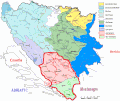world.wikisort.org - Croatia
Metković (Croatian pronunciation: [ˈmêtkoʋit͜ɕ]) is a town in the Dubrovnik-Neretva County of Croatia, located in the southeast of the country, on the banks of the river Neretva and on the border with Bosnia and Herzegovina.
Metković | |
|---|---|
Town | |
| Grad Metković Town of Metković | |
 Metković Old Town | |
 Coat of arms | |
 Metković Location of Metković in Croatia | |
| Coordinates: 43°03′N 17°39′E | |
| Country | |
| County | |
| Government | |
| • Mayor | Dalibor Milan (HDZ) |
| • City Council | 17 members |
| Population (2011)[1] | |
| • Town | 16,788 |
| • Urban | 15,329 |
| Time zone | UTC+1 (CET) |
| • Summer (DST) | UTC+2 (CEST) |
Demographics
The total population of the city municipality is 16,788 inhabitants (2011 census), in the following settlements:[1]
- Dubravica, population 90
- Glušci, population 76
- Metković, population 15,329
- Prud, population 497
- Vid, population 796
In the census of 2011, 96.8% of the population self-identified as Croats.[2]
| population | 1476 | 1694 | 1931 | 2230 | 2571 | 3014 | 3271 | 3941 | 4658 | 5301 | 6358 | 8810 | 11097 | 13370 | 15384 | 16788 | 15349 |
| 1857 | 1869 | 1880 | 1890 | 1900 | 1910 | 1921 | 1931 | 1948 | 1953 | 1961 | 1971 | 1981 | 1991 | 2001 | 2011 | 2021 |
History
The city was first mentioned in a 1422 court document as a small farming town. It remained this way until the nineteenth century. During this period the city found renewed investment from the country's Austrian rulers. With the arrival of the area's first post office and school, as well as the increase of trade with the Ottoman Empire, the city began to flourish. It was ruled by Ottoman Empire as part of Sanjak of Herzegovina between 1494 and 1685, then by Republic of Venice till 1797 and finally by French Empire before the Austrian Habsburgs took over. In 1875 and 1910 Emperor Francis Joseph I visited the city.
Metković is located near the ancient Roman settlement of Narona (today Vid). Narona was established as a Roman trading post, after Rome's successful war[3] (Illyrian Wars) with the neighboring Illyrian tribe Daors (ruins of their main city are located near Stolac), and successfully grew until the 3rd century AD. After that it went on a steady decline especially after a large 4th-century AD earthquake. Upon the arrival of Slavonic tribes in the mid-6th century AD, the city of Narona was abandoned with most parts being covered under silt that was carried by the river Neretva. Only minor excavations were done, most of them being concentrated on the location of Vid. One of the city's landmarks is its Church of St. Elijah, the city's patron saint.[4]
Education
Metković has the following education facilities:
- Primary schools:
- Stjepan Radić Primary school (Croatian language medium school)[5]
- Don Mihovil Pavlinović Primary school (Croatian language medium school)[6]
- Secondary schools:
For tertiary education students need to move to another city, the most common destinations are: Dubrovnik (business, management, accounting, music), Split (sciences, management, accounting), Zagreb (music, arts, sciences, applied sciences, engineering, architecture, education, humanities, management, accounting, business), Zadar (humanities, education, early childhood education) and Mostar.
Notable people
 Clergy
Music
Literature, theater, art
Sport
Other
See also
References
External linksWikimedia Commons has media related to Metković.
|
На других языках
- [en] Metković
[ru] Меткович
Ме́ткович (хорв. Metković ) — город в Хорватии, в юго-восточной части страны, в провинции Дубровник-Неретва. Население — 13 873 человека (2001), подавляющее большинство (96 %) — хорваты.Другой контент может иметь иную лицензию. Перед использованием материалов сайта WikiSort.org внимательно изучите правила лицензирования конкретных элементов наполнения сайта.
WikiSort.org - проект по пересортировке и дополнению контента Википедии


